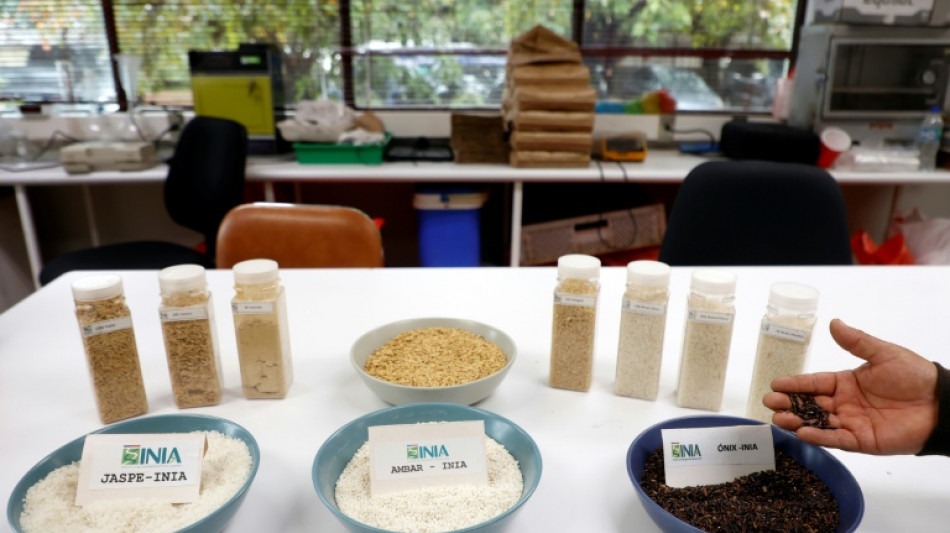
-
 US suspends green card lottery after MIT professor, Brown University killings
US suspends green card lottery after MIT professor, Brown University killings
-
Stocks mixed with focus on central banks, tech

-
 Arsenal in the 'right place' as Arteta marks six years at club
Arsenal in the 'right place' as Arteta marks six years at club
-
Sudan's El-Fasher under the RSF, destroyed and 'full of bodies'
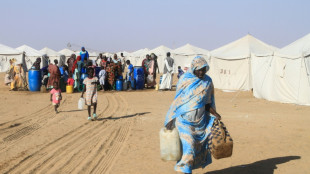
-
 From farms to court, climate-hit communities take on big polluters
From farms to court, climate-hit communities take on big polluters
-
Liverpool have 'moved on' from Salah furore, says upbeat Slot

-
 Norway crown princess likely to undergo lung transplant
Norway crown princess likely to undergo lung transplant
-
Iraq negotiates new coalition under US pressure

-
 France's budget hits snag in setback for embattled PM
France's budget hits snag in setback for embattled PM
-
Putin hails Ukraine gains, threatens more, in annual press conference

-
 US suspends green card lottery after Brown, MIT professor shootings
US suspends green card lottery after Brown, MIT professor shootings
-
Chelsea's Maresca says Man City link '100 percent' speculation

-
 Dominant Head moves into Bradman territory with fourth Adelaide ton
Dominant Head moves into Bradman territory with fourth Adelaide ton
-
Arsenal battle to stay top of Christmas charts

-
 Mexican low-cost airlines Volaris and Viva agree to merger
Mexican low-cost airlines Volaris and Viva agree to merger
-
Border casinos caught in Thailand-Cambodia crossfire

-
 Australia's Head slams unbeaten 142 to crush England's Ashes hopes
Australia's Head slams unbeaten 142 to crush England's Ashes hopes
-
Epstein files due as US confronts long-delayed reckoning

-
 'Not our enemy': Rush to rearm sparks backlash in east Germany
'Not our enemy': Rush to rearm sparks backlash in east Germany
-
West Indies 110-0, trail by 465, after Conway's epic 227 for New Zealand

-
 Arsonists target Bangladesh newspapers after student leader's death
Arsonists target Bangladesh newspapers after student leader's death
-
Volatile Oracle shares a proxy for Wall Street's AI jitters

-
 Tears at tribute to firefighter killed in Hong Kong blaze
Tears at tribute to firefighter killed in Hong Kong blaze
-
Seahawks edge Rams in overtime thriller to seize NFC lead

-
 Teenager Flagg leads Mavericks to upset of Pistons
Teenager Flagg leads Mavericks to upset of Pistons
-
Australia's Head fires quickfire 68 as England's Ashes hopes fade

-
 Conway falls for 227 as New Zealand declare at 575-8 in West Indies Test
Conway falls for 227 as New Zealand declare at 575-8 in West Indies Test
-
Japan hikes interest rates to 30-year-high
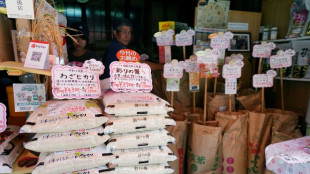
-
 Brazil's top court strikes down law blocking Indigenous land claims
Brazil's top court strikes down law blocking Indigenous land claims
-
Conway falls for 227 as New Zealand pass 500 in West Indies Test

-
 'We are ghosts': Britain's migrant night workers
'We are ghosts': Britain's migrant night workers
-
Asian markets rise as US inflation eases, Micron soothes tech fears

-
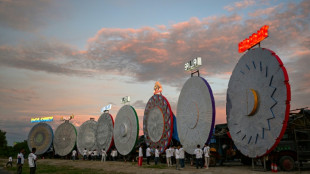 Giant lanterns light up Christmas in Catholic Philippines
Giant lanterns light up Christmas in Catholic Philippines
-
TikTok: key things to know

-
 Putin, emboldened by Ukraine gains, to hold annual presser
Putin, emboldened by Ukraine gains, to hold annual presser
-
Deportation fears spur US migrants to entrust guardianship of their children

-
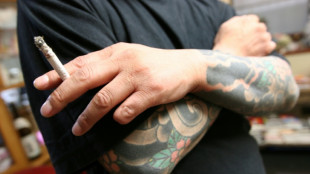 Upstart gangsters shake Japan's yakuza
Upstart gangsters shake Japan's yakuza
-
Trump signs $900 bn defense policy bill into law

-
 Stokes's 83 gives England hope as Australia lead by 102 in 3rd Test
Stokes's 83 gives England hope as Australia lead by 102 in 3rd Test
-
Go long: the rise and rise of the NFL field goal

-
 Australia announces gun buyback, day of 'reflection' after Bondi shooting
Australia announces gun buyback, day of 'reflection' after Bondi shooting
-
New Zealand Cricket chief quits after split over new T20 league

-
 England all out for 286, trail Australia by 85 in 3rd Test
England all out for 286, trail Australia by 85 in 3rd Test
-
Australian announces gun buyback, day of 'reflection' after Bondi shooting

-
 Joshua takes huge weight advantage into Paul fight
Joshua takes huge weight advantage into Paul fight
-
TikTok signs joint venture deal to end US ban threat

-
 Conway's glorious 200 powers New Zealand to 424-3 against West Indies
Conway's glorious 200 powers New Zealand to 424-3 against West Indies
-
WNBA lockout looms closer after player vote authorizes strike

-
 Honduras begins partial vote recount in Trump-dominated election
Honduras begins partial vote recount in Trump-dominated election
-
Nike shares slump as China struggles continue


Less-thirsty rice offers hope in drought-stricken Chile
A cold, dry part of Chile might not sound like the best place to grow rice, a famously thirsty grain that thrives in tropical conditions.
But a new strain of the world's favorite cereal developed by scientists in the drought-plagued South American country has generated hope that rice can be grown in seemingly inhospitable conditions.
Using an innovative planting technique, Javier Munoz has been trialling the "Jaspe" strain created by experts at the Agricultural Research Institute's (INIA) Rice Breeding Program.
It is one of several research efforts worldwide to come up with less resource-hungry crops at a time of increased water scarcity in parts of the world due to global warming.
Using Jaspe in combination with a growing method that requires only intermittent watering cut the Munoz family's water consumption in half in a country that has for generations cultivated rice in flooded fields, or paddies.
At the same time, yield rocketed, with each seed yielding about thirty plants -- nearly ten times more than a conventional rice field.
Irrigating rather than flooding rice fields "is a historic step... towards the future," Munoz, 25, told AFP at his farm in the region of Nuble, a nearly five-hour drive south from the capital Santiago.
Next year, he said, he hoped to increase his production area from one hectare to five.
Chile's Maule and Nuble regions contain the southernmost rice fields in the world.
Typically grown in wetter, tropical areas, rice cultivation in Chile has been hampered by an unprecedented megadrought, now in its 15th year and driven by climate change, according to scientists.
Each Chilean eats on average 10 kilograms (22 pounds) of rice per year -- nearly half of which is grown domestically and 80 percent of that in flooded fields, according to the SRI-Rice research center at Cornell University.
The flooding method, which requires about 2,500 liters (660 gallons) of water per kilogram (2.2 pounds) of rice, is used around the world to combat weeds and regulate the temperature around vulnerable seedlings.
- Less methane -
The Jaspe rice strain was obtained by INIA agricultural engineer Karla Cordero and colleagues by crossing a Chilean seed with a Russian one better adapted to cold and dry climates.
The modified seed is then grown using the SRI growing technique developed in Madagascar in the 1980s that involves spacing the seedlings further apart in enriched soil, and watering only sporadically to build a more resilient root system.
Cordero presented the results of nearly 20 years of experimentation -- conducted with backing from the Inter-American Institute for Cooperation on Agriculture (IICA) -- at an International Rice Research Conference in Manila in 2023.
The findings have yet to be published in a peer-reviewed scientific journal, but Chile's Agriculture and Livestock Service, an arm of the agriculture ministry, gave the green light in 2023 for the new strain of long-grain white rice to be rolled out commercially.
Apart from using less water and fewer seeds, the new Jaspe-SRI method also emits less methane, a potent planet-warming gas more famously produced by cows.
Rice cultivation in flooded paddies crawling with microorganisms is responsible for about 10 percent of human-caused methane emissions, according to the UN's Food and Agriculture Organization.
- 'Climate-smart' -
Jaspe has proven to be more resistant to storms, floods and heatwaves. "The plants are much more robust, which allows rice to be produced without flooding," Cordero said.
Makiko Taguchi, a rice cultivation expert at the UN Food and Agriculture Organization (FAO), told AFP the Chilean work amounted to "a promising approach to improving rice production while reducing the environmental impact."
Pointing to similar work being done in Japan, she said: "Obtaining resistant varieties is one of the main ways to increase resilience to climate change."
Cordero said the results suggested the approach could also work in other parts of the world "where large quantities of rice are produced and where there are droughts."
The team hopes to test Jaspe soon in Brazil -- the largest rice producer in the region -- and in other South American countries.
"This is the future," said Munoz. "If we want... food security and care about the environment, this is the way."
D.Schneider--BTB




